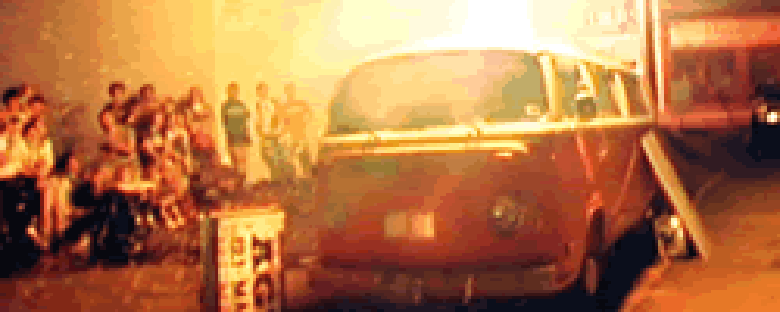Reviews
Nate and Josh (in sum, comprise Friends Forever) are invited to play a live set on Los Angeles radio station KXLU. The raw, unstaged footage displays what has become a typical act for the pair: Nate is on drums, Josh on bass, both scream into microphones held in their mouths. The room is filled with bubbles, and fog begins to obscure clear action. The scene — as many in the film Friends Forever — becomes chaotic; the sound grows louder and the band becomes decreasingly recognizable amidst the sporadic flashes of a strobe. This chaos is so familiar and intended that the resulting fire alarm on the KXLU set is at first undistinguishable among the discharges of sound.
Of course, Friends Forever is a novelty, a source of curiosity that legitimizes their position as the subject of the film, though the band’s ploy is never fully reasoned nor understood. Ben Wolfensohn’s documentary is floated, firstly, by the curiosity abundant in its subject, and also by the sympathy and interest in its depiction.
Nate and Josh, residents of Denver, Colorado, are felled by definitive social labels. Their music (though victim to exploratory tastes) is impassioned, creative, and imaginative. It is also, merely, something to do, a radical and reactionary answer to common youth ennui.
Their act is distinguished for its mobility. They relay a story of a cancelled booking, and the ensuing decision to play the show in front of the initial venue, inside their Volkswagen van. It is a unique opportunity drawn from otherwise ending circumstances.
The film details Friends Forever’s tour across the California coast in 2000, made with little planning (their sole requirement in playing is finding the right parking spot). The team’s act draws meager yet interested crowds, angry cops, and occasional demands for the noise to quit. Their act is consistently unprofitable, yet they continue.
It is revealed midway through the film that Nate still lives with his parents. He is seen aside his father, whose dress and comfortable speech are a stark contrast to his son. Drawing from this heritage, Nate’s music is a channeling of stifled angst against familial and social assumptions and labels.
Josh is similarly dissolute. There is a scene in which he smashes his guitar — an act that should conjure its use as a musical rite — yet the act underlines his purpose. He personifies the instrument. It insults his sexual ability. He punishes it. His music is a comparable and related reaction.
Friends Forever is not hindered by its self-directed efface (“I have absolutely no talent,” Nate remits at one point), but reinforced by it. The band is an act of intended chaos and noise, and ultimately a fraught display of disinterest.
Ben Wolfinsohn’s film is often hilarious, often dramatic, with moments of exhilaration. Intentions and views are extracted with sympathy. The film has a depth not relayed in its synopses, and maintains objective distance — it neither extols nor exploits its subject.
We don’t do comments anymore, but you may contact us here or find us on Twitter or Facebook.



